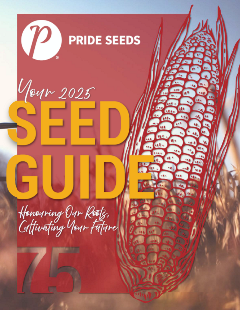WELCOME JEREMY O'SHEA TO PRIDE SEEDS

Enhance your knowledge and stay ahead with PRIDE SEEDS Corn and Soybean School videos.
Browse our selection of products below
___________________________________________________________________________________________________________________________________________

2024-2025 PRIDE Seeds Product GuideYou can find all of our products on the website, including supporting performance data and create your own personalized guide called My Guide. You can also download the digital version of our printed product guide which includes product comparison charts. |
SHOP THE PRIDE SEEDS E-STORE
-7.png?sfvrsn=87920db3_3)
STAY UP-TO-DATE WITH PRIDE SEEDS LATEST BLOGS, NEWS AND ARTICLES
Hybrid Performance by Plant Population by Soil Type
This plot was designed to learn more about how specific PRIDE Seeds hybrids react to different planting populations and environmental conditions. 
The hybrids were planted in strips using a VR prescription to vary populations. The objective was to compare the performance of five hybrids related to population, soil type and yield zones. 
Mother nature had a slightly different plan in store for this particular plot. 2020 delivered the worst drought in 12 years; couple that with light textured soils and what we saw here was more of a comparison in drought stress tolerance. 


Hybrid yield results by planting population
To more easily compare hybrid response to planting population in drought conditions, we will focus on the yield differences from the best and poorest soil types.
A6018G2 RIB
Strong performance considering it is south of ideal growing region. Do not see a large difference in yield between planting populations for each soil type, that the lack of moisture was the yield limiting factor regardless of population.
A6572G2 RIB
We saw slightly stronger performance at lower populations. The drought conditions paired with the increased competition of high populations caused a slight decrease in yield at higher plant stands. 34K plant population seems to be the most consistent across soil types. Past data shows A6572G2 has top yield potential in a wide range of environments.
A6585G8 RIB
We see the most consistency between soil types at the 34K seeding rate. A6585 is known to have a semi-flex ear however under these drought conditions it is evident that the ability to flex was limited.
A6694G2 RIB
This hybrid had a great 2020 season in many environments. At this site, A6694G2 did not show very much response to population changes however there was some ear flex at the lower planting populations resulting in a higher yield at 26K plants than at 34K which seems to be the strongest in other hybrids. A6694G2 could be a good candidate for variable rate planting.
A7197G8 RIB
This is the hybrid that the plot cooperator was most excited about throughout the season. A7197G8 faired better in the drought stress conditions compared to other hybrids in the plot. This hybrid has stable performance at the different populations tested in this trial.
It is commonly accepted that in a variable rate seeding situation, populations should be lower on more drought prone soils in order to minimize competition to maximize yield. Using a hybrid that has good ear flex is also recommended. What we saw in this trial was the opposite. In the low yield zones (made up of Burford and Brisbane soils) we saw higher yields at 38 000 and 34 000 seeds per acre and alternatively in the higher yield zones (made of Crombie and Granby soils) the yields were pretty much equal from 26 000 to 38 000 seeds per acre with a slight edge going to the lower populations. It was evident that with the severe conditions of 2020, even the traditional higher performance zones yielded significantly less than normal.
Conclusion
The incredibly dry 2020 growing season was the main yield limiting factor in this trial. Lack of moisture paired with light soils contributed to low yield averages across hybrids and across planting populations on a farm that usually averages 50bu/ac higher. Looking at the hybrid by population yield data does not give a clear idea of if and how each hybrid will flex given the differing populations but what we can see is how the hybrids reacted to the drought stress based on soil type. A7197G8 seems to be the most resilient in drought condition. A6694G2 seemed to flex the best at low populations given the stress of the year. Generally, it appears that 34 000 seeds per acre offers the most consistent yield in drought conditions however the economics of that rate are questionable.
Click here for the PDF of this project and the rest of the PRIDE Seeds 2020 Agronomy Projects .
TAKE PRIDE IN YOUR INBOX
Expert advice, news and information
THE PRIDE SEEDS ADVANTAGE
Farming is one of the most demanding industries in the world, subject to a variety of factors such as time, weather, and global pressures. You know this every time you look out the window and think about the field in front of you. Growers and dealers deserve an advantage: The PRIDE Seed Advantage.
LEARN MORETHE PRIDE SEEDS ADVANTAGE
Every year PRIDE Seeds works hard to produce leading-edge products that enable success where it matters most, on your farm. Our dedicated team strives to provide sales expertise, agronomy support, quality production, and service tailored to meet your needs.
LEARN MORE

Leave a commentOrder by
Newest on top Oldest on top